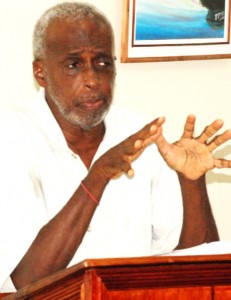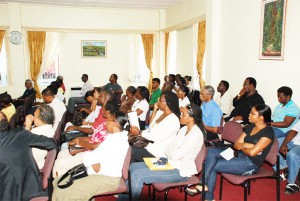– Dr McGowan says in final Rodney Chair lecture
“Guyana earnestly needs in 2008 an equivalent of Nelson Mandela. If apartheid South Africa can turn around, there is hope for every other divided nation including Guyana. It will however require a much higher quality of political leadership than we have experienced for the last 42 years,” said Dr Winston McGowan when delivering his final lecture as holder of the Walter Rodney Chair of the University of Guyana on Friday evening.

During his presentation entitled ‘Modern Guyana: A historical interpretation: The PPP years, 1992 to the present’ Dr McGowan articulated his conviction that “despite its wealth of intellectual talent and its enormous potential in agriculture, Guyana has managed to self destruct through the limitations of political leadership.” No leader, he continued, had “as yet made sufficiently serious efforts to produce national unity in bridging the racial divide.”
Prof McGowan expressed the view that the most earnest and sincere in this thrust had been Walter Rodney.
It was remarked that it appeared that in the Guyana scenario, governments always seemed to better know what must be done when in opposition than when in office.
In elucidating the positive changes associated with PPP rule, Dr McGowan said these included an improved economy, the more widespread ownership of homes by Guyanese, the reduction in national debt via debt relief, (it was recalled that in May 1997 the governments of France, the UK, the Netherlands and Denmark agreed to reduce Guyana’s debt by 67%), an expanded economic pie which had resulted in increased allocation “more in the direction of social sector development, eg health and education.”
 There were, however, negatives associated with the PPP’s term, the professor said, which he identified as the continued problem of poverty (it was pointed out that economic growth had not always translated into economic development); a growth in major social ills, namely drug trafficking, gun running and the use of guns in violent crimes; HIV/AIDS; corruption in public life; the continuous devaluation of the currency; a substandard education system; and the continued existence of racial and political polarization with a political culture that divided the nation into ethnic enclaves. Guyana, thus was still encumbered by an undeveloped status.
There were, however, negatives associated with the PPP’s term, the professor said, which he identified as the continued problem of poverty (it was pointed out that economic growth had not always translated into economic development); a growth in major social ills, namely drug trafficking, gun running and the use of guns in violent crimes; HIV/AIDS; corruption in public life; the continuous devaluation of the currency; a substandard education system; and the continued existence of racial and political polarization with a political culture that divided the nation into ethnic enclaves. Guyana, thus was still encumbered by an undeveloped status.
Adverting to the salutary features of the Bharrat Jagdeo stewardship, Dr McGowan pinpointed the moves to end the GT&T monopoly; Guyana’s status as an early signatory of the Caribbean Single Market and Economy; and the favourable result of Guyana’s legal pursuit in determining the maritime boundary with Suriname.
Nevertheless there were some “very disturbing” features of this period of administration as well, which the professor highlighted as encompassing crime and the absence of public safety; the rise of phantom squads and extra-judicial killings; the emergence of child criminals; the progressive decline of the University of Guyana because of a failure to inject the money needed to recruit and maintain highly qualified staff, an adequate library and laboratories.
Friday’s lecture was the final presentation in a three-part 2008 series by Dr McGowan. The initial lecture had examined some of the main developments between the introduction of Crown Colony government in 1928 and the achievement of political independence in 1966. The second had traced the evolution of Guyana during the five phases into which the years of PNC rule were divided while the third examined the distinctive features of the various administrations, which had governed Guyana since the People Progressive Party’s accession to power in 1992. It concluded with an evaluation of the current state of the country especially when compared to 1992.
The Walter Rodney Chair was launched in 1998 at the University of Guyana, to honour the memory of Dr Walter Rodney, a distinguished scholar of history. The first holder of the chair was Professor Ali A. Mazuri, Director, Institute of Global Cultural Studies, Binghamton University, New York, while Professor McGowan who was appointed in 2002 is the second.
Dr McGowan holds a BA Honours degree in History from UWI and a PhD in West African History from the University of London. He has been a lecturer in the Department of History at the University of Guyana since October 1970 and served as Head of Department of History for eleven years. He was made a Professor in 2000. His main specialties are African and Guyanese history, the history of slavery in the Americas and the history of revolutionary change. He has also written extensively on cricket.

